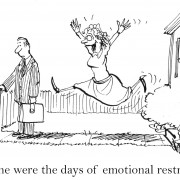You & Your Porn
The Reality of Porn
Watching internet porn is a reality in many people’s lives – for both men and women. A British 2012 sex census found that 41 per cent of women and 76 per cent of men admitted to watching porn once a month or more, and that 19 per cent of women and 58 per cent of men watched it once a week. Many more stated that they would prefer not to reveal their usage it so it would be fair to assume that the real numbers enjoying porn are even higher.
It should be noted that porn has no meaning in and of itself – it is those watching who give the content meaning. And people, lots of people enjoy the content, frequently watching as couples to enhance their sex lives.
Porn can and does create very unrealistic perceptions of men and women against which “ordinary” sex may get unfavourably compared. Perfect bodies, phenomenal stamina and endless orgasms are not things that most couples would feel able, or even want to aspire to at the end of a long hard day at the office or with the kids. Many couples will prefer tenderness and intimacy as the major contributor to good sex.However, for those using porn why can watching porn impact on a relationship?
A Chicken And Egg Conundrum
Difficulties seem to arise if/when one partner feels isolated and alone while their other half blithely carries on and ignores their partner’s feelings. Sometimes one partner fears that the use of porn leads to relationship withdrawal; or if one partner thinks of porn during sex and dissociates from their partner resulting in a potential lack of intimacy.
However another way of looking at this is that other factors, ( such as anxiety, physical pain, anger, shame, boring partner, fertility issues etc) can lead to withdrawal from a relationship which may then lead to porn use; or one or other factors lead to dissociating during sex and therefore the individual thinks of porn during sex.
To Talk Or Not To Talk?
So if you have found out that a partner is doing something that feels detrimental to you, can you talk directly about your concerns and have a clear expectation that you will be heard? If you can this might lead to change but even if that is not the result at least your other half knows how you think and feel.
However if you cannot talk directly, and you desperately want an explanation, or for something to just stop, you can get into seriously unhelpful arguments with accusations flying around which will achieve nothing.
So if you object to the porn your partner views before you confront them try to take a step back to think about your own reactions.
What Do You Really Think?
Perhaps you think it is disgusting and has no place in a relationship? Perhaps you don’t mind but feel excluded? Or do you suspect your sexual relationship isn’t satisfying your partner and they’ve decided to find out if porn is more of a turn on?
Perhaps your partner simply takes it for granted that you are fine with their porn use because you have never complained. If that’s the case then don’t rely on their mind reading skills –it doesn’t work; making time to talk about how you feel is the first step to clearing the air. Are you perhaps concerned by the time spent watching porn and are concerned that it impacts negatively on their everyday life and relationships?
Whatever your concerns you have to begin by talking. Be clear about how you feel – vagueness causes more confusion and what needs to be said can get scrambled. It is important to listen carefully to what your partner is telling you too.
But what if you feel you can’t speak to them about it? What is it that might stop us from being honest with a partner about this or even anything else? Sometimes it is because we actually fear that our own opinion might be so different to our partner’s that by expressing it they may end up deserting us.
Consider also if you are in a relationship where you feel that you are never listened to or that your needs aren’t usually met, it is easy to get out of the habit of having any real expectation of change. This can quickly descend into a ‘what’s the point’ conversation and then of course nothing does change except that the sadness, anger and resentment just get bigger.
Porn is Personal
If it is not for you, say so. Any partner who doesn’t listen and still wants to indulge in heavy usage may not be the right partner for you. On the other hand don’t necessarily exclude experimenting with it together either. As with anything to do with sex, agreeing how far you want to take things is a definite requirement in any healthy relationship, so don’t let anyone insist you look at or re-enact the things they want to if you are not comfortable.
If your partner humiliates you, calling you weird for not wanting to watch porn it might be best to give them a very wide berth because demeaning anyone in this manner is usually a very negative reflection of the person attempting to shame you.
So, go for it, be brave and state how you feel and what you want and expect from your partner. If you can create a positive dialogue together and you’re both game, a mild flirtation with porn may be just the thing to reignite the passion










